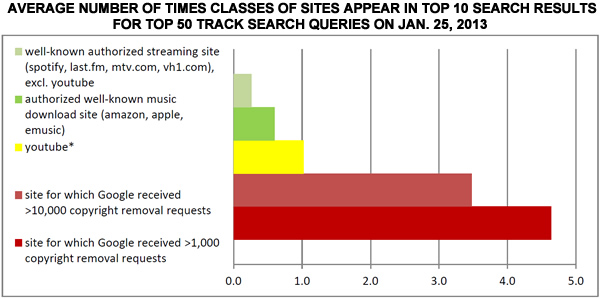A new report issued by the RIAA lambasts Google's piracy-curbing efforts, claiming the search giant's promise to demote unsavory file sharing sites several months ago has shown "no demonstrable impact" on the demotion or removal of links to well-known copyright violators. The music agency reports that "serial infringers" – identified as such based on the number of take down requests Google has received – appear on the Google's first page of search results a whopping 98 percent of the time.

Additionally, the RIAA says well-known and legitimate sources, like iTunes and Spotify, were drowned out by seedy, unauthorized websites nearly half the time.
"Well-known, authorized download sites, such as iTunes, Amazon and eMusic, only appeared in the top ten results for a little more than half of the searches. This means that a site for which Google has received thousands of copyright removal requests was almost 8 times more likely to show up in a search result than an authorized music download site."
Source: RIAA, Google Report Card (2013)
Those "top 10" results are important to the RIAA, as 94 percent of Googlers don't make it past the first results page.
Suggestions provided by Google's auto-complete also drew the RIAA's criticism. The 15-page report claims that 88 percent of its test searches for popular songs provided automatic suggestions which added "piracy related" terms to its queries.
Although the search giant hasn't responded to the RIAA's report, Google might contend that it already does much more to counter piracy than required by law. Google has long fought against government interference when it comes to filtering search results, but continues to refine its own, voluntary anti-piracy efforts with ranking penalties, deploying automated filtering systems and modifying its autocomplete results to exclude chancy suggestions.
Alongside those efforts though, Google has aimed to strike a balance. The company publicizes copyright takedown requests and has backed certain sites accused of – but perhaps not clearly – violating the DMCA.
Americans seem to have mixed feelings on whether Google should play a more proactive role in filtering pirated materials. However, one survey showed that the vast majority of Americans would prefer Google censor pirated materials than involve the U.S. government.